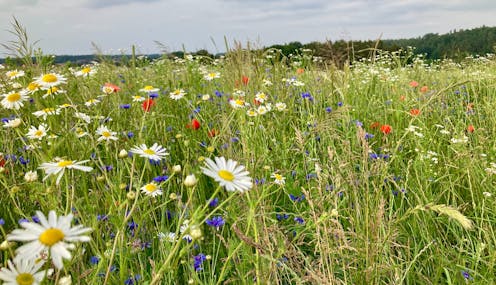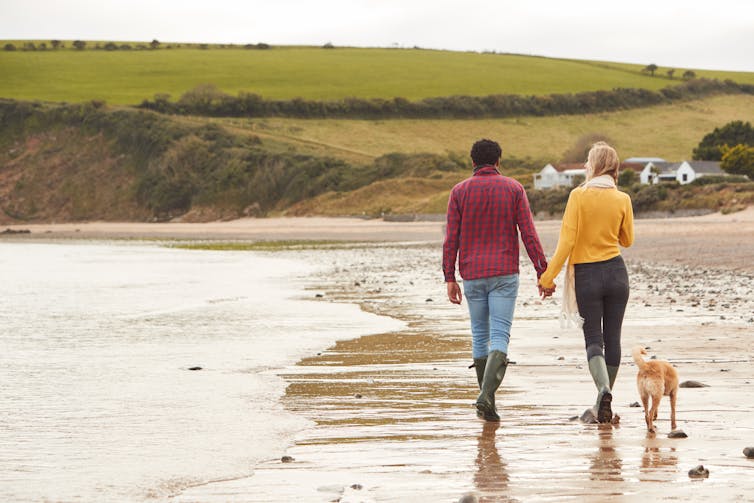
After the conclusion of UN biodiversity conference Cop16, it was easy to feel disappointed. In Cali, Colombia, discussions fell short on how to monitor targets and progress remains slow. Despite agreements, Cop16 lacked urgency from governments and the UN on how to halt the crisis in the natural world.
Like many others, the UK government remains focused on net zero targets for greenhouse gas emissions. It can feel like biodiversity – the thing that makes our world a vibrant and beautiful place – has been left behind.
So it should come as good news that in my research I have heard stories from business owners who are taking it upon themselves to make a change. These are owners of small and medium-sized enterprises (SMEs) who are going from business as usual to business with nature as an equal partner.
We all connect with nature in different ways, from the joy of hearing a robin singing to the annoyance of having a seagull steal your lunch. This is the same for business – there are negative and positive interactions.
My ongoing research is finding that business owners often take their environmental passions and turn them into company values. The business managers, creators and entrepreneurs I spoke to are putting nature at the centre of their actions and decisions. And the markets they operate in are changing as customers see past simply using nature as a brand image. I found that it’s no longer acceptable to only think about nature for advertisements. It should also be the focus of the product.
This consumer expectation has resulted in many small businesses evolving their supply chain, industry and services to reflect their nature-dependent branding – the very opposite of greenwashing.
What does it mean to trade on nature?
Take an outdoor clothing company. Its adverts would likely feature rugged footpaths, wild hillsides and beautiful sandy beaches.
A world without diverse flora and fauna would probably ruin the outdoor clothing market – very few people will want to explore a polluted forest. So biodiversity is an important aspect of the success of their product in both advertisement and use.
Or a more complex example might be a company that produces high-end kitchen units. Most of their product is sold locally, and the area is renowned for its landscape. This environment draws both potential customers and potential employees to live in the area – so threats to the landscape also present a long-term risk to the business.
Both of these examples show how businesses depend on biodiversity. Despite the shortcomings of Cop16, those businesses that are already taking action can offer valuable lessons to governments and to bigger corporations.
The key ideas emerging from this research include understanding that businesses depend on biodiversity; that now is the time to innovate and adapt; and that individual connections with nature can be the trigger to create change.
As an example of this third point, one interviewee from a business selling Cornish food hampers talked about how they had noticed the lack of bees. This prompted them to talk to their team about how they manage their land. And after consulting a wildlife volunteer, they turned half of their land over to meadow and created a pond. They are continuing to review the environmental impact of their hampers, reviewing the supply chain and are now creating a decarbonisation plan.
These owners are connecting with nature locally and bringing this to their brand values. For some owners this has meant difficult conversations with customers. Tourists usually would not appreciate a hornets’ nest in their holiday home, but at one venue staff took the time to share their passion for insects with the guests, who then understood that they could actually co-exist.
Once inspired, however, it can be difficult to know what to do next. Another interviewee said that they knew what they were doing wrong but found it difficult to know how to do better.
Owners have reported that getting information and changing direction can be the hardest part, especially as business impact on biodiversity can be vast.

One events venue worked hard to find information to change its waste management systems. The team knew that waste has a negative impact on nature and so started small with recycling. They have now developed a zero-waste project for the entire site. They researched packaging, talked to waste management companies and discovered that not all recyclable food packaging could be processed locally.
This led to a comprehensive review of the supply chain. They worked with local catering companies to change the food packaging used during events. It also meant changing customer behaviour so that waste was put in the right bin.
Making progress on their zero-waste goal has meant years of innovating and adapting. But the success has been achieved through bringing their suppliers, staff, external experts and technology along on the journey. It began with the value of nature and innovation, and developed into a whole-business approach.
This shows that one business’s decision to find out more can have far-reaching benefits as they collaborate with others to reduce their impact.
Many businesses’ image, brand and produce require a healthy planet. It is no longer enough to talk about a commitment to nature, it requires action or their business simply cannot expect to survive.
I have found that businesses taking action now are leading the charge when it comes to positive reputations with customers. The innovators are developing products that respond to their landscape, working with suppliers with similar mindsets and carving out loyal customer bases. Examples I’ve encountered include making big changes to premises, suppliers, livestock and ingredients.
Businesses can start by taking a moment to look at the nature around them, before examining the values demonstrated across their supply chain and in the workplace. Whether Cop16 results in future change is yet to be seen, but businesses are thriving by taking action for biodiversity now.
Francesca Boyd works for University of Exeter which has been commissioned to deliver the Green Futures Solutions project on behalf of the Growth Hub by the UK Shared Prosperity Fund as part of the Cornwall and Isles of Scilly Good Growth Programme.
This article was originally published on The Conversation. Read the original article.







